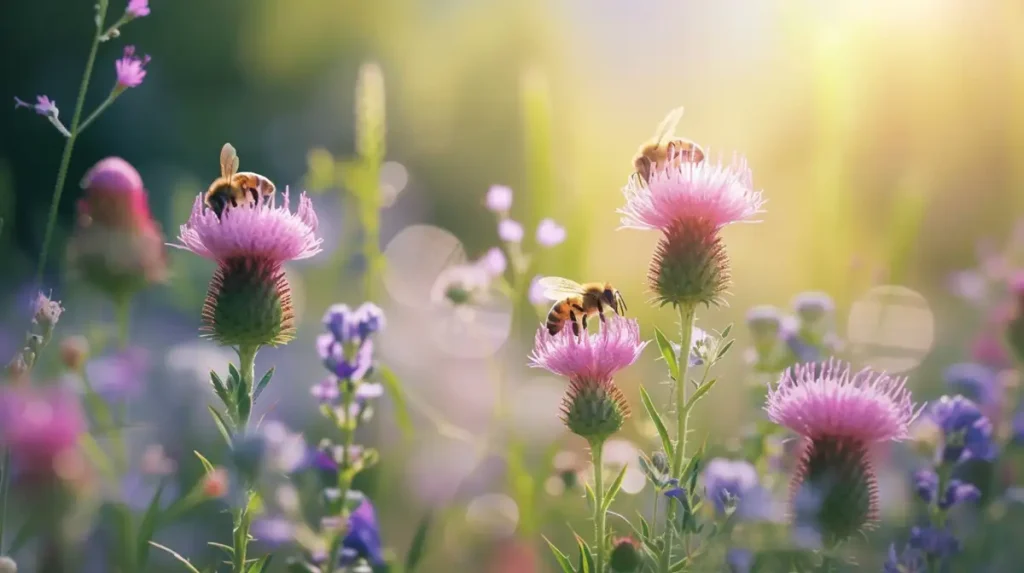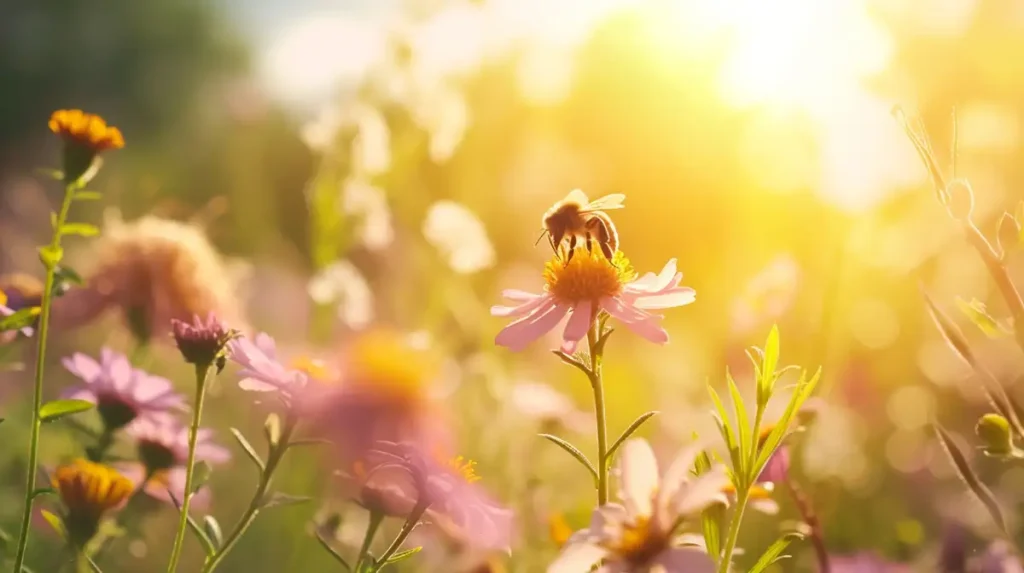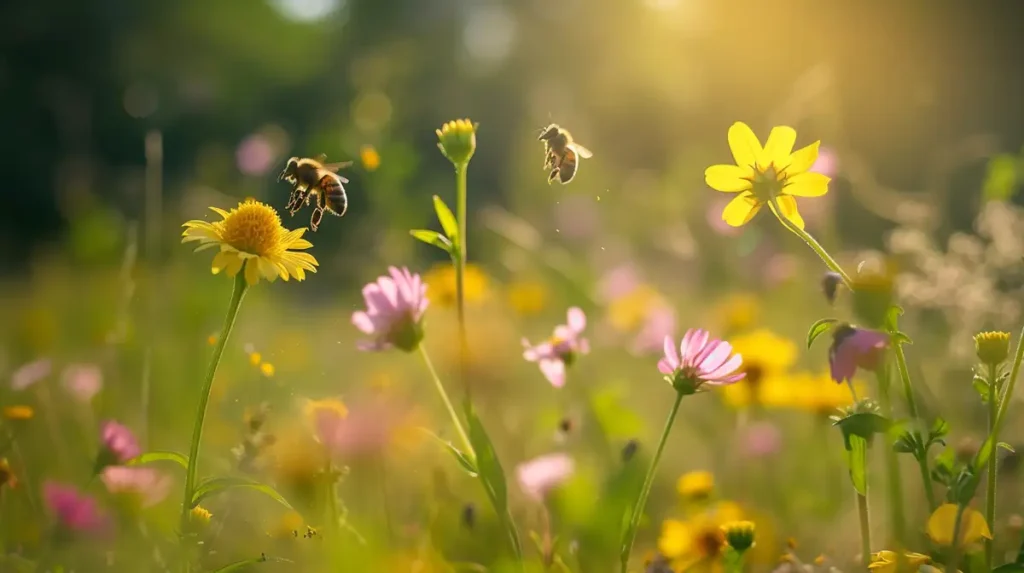Table of Contents
Bees are essential for pollination, facilitating the growth of fruits, vegetables, and flowers, which are crucial for human food supplies and ecosystems. They contribute significantly to biodiversity and agricultural productivity, making them vital for environmental health and food security.
In the below paragraphs, we will take a more detailed look at this topic.
You are probably well aware of – or at least heard about –the importance of bees. These little creatures are absolutely vital to the ecosystem; without them, most of the plants we eat would not survive. Although there are other pollinators – such as butterflies, wasps, and moths – the bee is by far the most important pollinator we have, and they provide billions of dollars’ worth of pollination services across the world.
Key Takeaways
- Bees are essential pollinators and provide billions of dollars’ worth of pollination services globally.
- Bees are often misunderstood and wrongly considered as pests; they do not intentionally sting humans or animals unless they feel threatened.
- The decline in bee populations is due to habitat loss, climate change, food source depletion, and exposure to pesticides.
- If bees disappeared, it would have a massive impact on the world, including the extinction of certain plants and reduced reproduction rates for others, ultimately affecting the entire food chain.
- Human nutrition would be negatively affected as manual pollination is labor-intensive and expensive, leading to reduced availability of fruits and vegetables.
- To help save bees, plant bee-friendly plants, avoid using chemicals in your garden, and use peat-free compost.
- Bee hotels are a beneficial addition to backyards, providing bees with shelter and rest areas.
Below is a detailed table explaining the significance of bees to ecosystems, agriculture, and human life:
| Aspect | Importance of Bees | Impact on Humans | Impact on Ecosystems |
|---|---|---|---|
| Pollination | Bees are primary pollinators for a variety of plants, including crops and wild vegetation, enhancing plant reproduction and fruit development. | Ensures the production of food crops, contributing to food security and nutritional diversity. | Supports biodiversity by aiding in the reproduction of flowers and plants, which serve as habitats and food sources for other species. |
| Biodiversity | Through their pollination activities, bees support the growth of a wide range of plants, contributing to diverse ecosystems. | A diverse plant base sustains various animals and keeps ecosystems resilient against pests and diseases. | Healthy, diverse ecosystems are better able to withstand environmental stressors and provide services like air and water purification. |
| Agricultural productivity | Bees increase yields of fruit, vegetable, and seed crops, which are essential for human consumption and agricultural economies. | Enhances economic stability for farmers and agricultural communities; increases availability of a wide range of crops. | Increased plant diversity and productivity contribute to soil health and reduce erosion. |
| Honey and bee products | Bees produce honey, wax, propolis, and royal jelly, which have various nutritional, medicinal, and industrial applications. | Provides food products, natural remedies, and materials for cosmetics and candles. | Honey production supports the survival of bee colonies, which in turn supports plant pollination and ecosystem health. |
| Ecosystem Services | Bees play a crucial role in the functioning of ecosystems, contributing to the growth of trees, flowers, and other plants that serve as food and shelter for creatures. | Forests and wildlands supported by bee pollination help regulate the climate and water cycles, contributing to climate resilience. | Healthy ecosystems provide habitat for wildlife, support clean air and water, and contribute to soil fertility. |
This table underscores the multifaceted importance of bees to both human societies and natural ecosystems, highlighting why their conservation is critical.
Are Bees Pests?
Unfortunately, there are still many people that view bees as pests and, indeed, are actually scared of them. This is usually because they have misunderstood both the bee and its intentions. Contrary to what some individuals believe, bees do not go out of their way to sting humans and animals. In fact, the reality of the matter is that bees will only sting to defend their home, and they will only do so as a last resort. The reason for this is because once a honey bee stings, it is almost certain to die. Their stingers have barbed lancets that lodge in the skin of mammals. When a honey bee tries to fly away after stinging, the stinger is ripped from its body and left behind, at the same time pulling part of its abdomen and digestive system with it. When this happens, the bee cannot survive.
Bees are actually quite docile insects, and those we see hovering around our plants are looking for nectar and pollen to take back to the hive. The hair-like structures on their body attracts pollen when they visit flowers. When they then visit other flowers of the same species, the collected pollen brushes off and pollination occurs, allowing said plants to ‘reproduce’.
The work done by bees equates to billions of dollars’ worth to farmers across the world every year. Even with manual pollination, it is unlikely that humans could ever replicate the work of the bee. This is the reason these creatures are so essential to the natural world.

What Would Happen Without Bees?
Sadly, bees are under threat and have been declining in population for a few decades. There are many reasons for this decline including loss of habitat, climate change, loss of food sources, and exposure to pesticides. There is concern everywhere over about the fate of the bee and what would happen to our world without them.
Well, in a nutshell, if bees disappeared, our world would be impacted massively. For example, some plants, such as the bee orchid, are pollinated exclusively by bees. This plant would die off quickly without human intervention. If this plant were to die off, it would have a ripple effect on the food chain that it is a part of.
Even the plants that are only partly pollinated by bees would suffer without them, as bees are by far the greatest pollinators that we have. Without the bee, these other plants would almost certainly produce fewer seeds and would in turn have lower reproduction rates. The animals that depend on these plants to survive would also be affected.
Humans would see a huge change in the availability of the fruit and vegetables that we take so much for granted today. For instance, cherries and blueberries are almost entirely pollinated by honey bees, but if they had to be manually pollinated by farmers, it is highly unlikely that they could be grown at even a fraction of the scale as when bees pollinated them.
- Carter, Anthony (Author)
- English (Publication Language)
- 194 Pages - 02/28/2024 (Publication Date) - Independently published (Publisher)
With such a devastating impact on fruit and vegetable crops, there is no doubt that human nutrition would be affected. And because human pollination is very labor intensive and expensive, it is very likely that only crops that are cost effective to produce would be grown.

What Can You Do to Save the Bee?
With so much emphasis on the importance of bees, you might be wondering if there is anything you can do to help. Fortunately, we can all play a part in saving the bees.
One of the best ways to help bees to survive is to plant bee-friendly plants in your backyard. You could even have a window box with these plants if you don’t have a yard to plant them in. When buying new plants, look for those that are free from pesticides, and avoid using chemicals in your garden. Peat-free compost is recommended, which will help keep peat bogs intact (these natural habitats are also under threat).
Bee hotels are also a great addition to any backyard. These trendy wooden structures are the perfect place for bees to rest and shelter in. They usually contain bamboo tubes in which the bee can crawl. You can look online for instructions on how to make your own or you can buy them ready-made. Not only do they provide a place for bees to rest, but they also look fantastic.
Why Do We Need Bees – Conclusion
You may have often wondered why we need bees, but the truth is that they are vital to our ecosystem; without them many of the crops we rely on would die off. Bees are the most important pollinator we have and are worth billions to the farming industry every year.
However, bee populations are declining, and we need to act now to save them. Growing bee-friendly plants in your backyard, in pots, or window boxes will help these crucial insects to survive.
FAQs
Q: Why are bees important for the environment? A: Bees play a crucial role in pollination, which helps plants reproduce. This process is essential for the growth of fruits, vegetables, and nuts that make up a significant portion of our diet, as well as for the overall health and diversity of ecosystems.
Q: What is pollination and why is it important? A: Pollination is the process by which pollen is transferred from the male part of a plant (anther) to the female part (stigma), resulting in fertilization and seed production. This process is vital for the reproduction of plants, and ultimately supports the food chain and biodiversity.
Q: How do bees contribute to food production? A: Bees are responsible for pollinating around 70% of the world’s most important food crops. They help produce a wide variety of fruits, vegetables, nuts, and seeds that we rely on for our food supply, directly contributing to global food security.
Q: Are all bees involved in pollination? A: While not all bees are pollinators, there are more than 20,000 species of bees worldwide, many of which play a significant role in pollination. The most well-known pollinators are honeybees, but many other species, such as bumblebees and solitary bees, are also important pollinators.
Q: What would happen if bees disappeared? A: If bees were to disappear, it would have a profound impact on global food production and ecosystems. The loss of bees could lead to a decline in plant reproduction, resulting in reduced crop yields, increased food prices, and decreased food security. Additionally, a decline in plant biodiversity could negatively affect other wildlife and ecosystems.
Q: How do bees impact biodiversity? A: Bees contribute to plant biodiversity by pollinating various plant species. This results in a diverse range of plant life, which in turn supports diverse animal and insect populations. A healthy ecosystem relies on this intricate network of interactions to maintain balance and resilience.
Q: Why are bee populations declining? A: Bee populations are declining due to multiple factors, including habitat loss, pesticide exposure, climate change, disease, and parasites such as the Varroa mite. The combination of these stressors has led to a significant decline in bee populations worldwide.
Q: How can we help protect bees and their habitats? A: There are several ways to help protect bees, including planting bee-friendly flowers and plants, reducing or eliminating the use of pesticides, creating nesting habitats, supporting local beekeepers, and advocating for policies that promote bee conservation.
Q: Can other insects replace bees for pollination? A: Although other insects like butterflies, flies, and beetles can also pollinate plants, bees are the most efficient and effective pollinators. Relying solely on other insects would likely lead to reduced crop yields and decreased plant biodiversity.
Q: How can I attract bees to my garden? A: You can attract bees to your garden by planting a variety of bee-friendly flowers, including native plants that bloom at different times throughout the year. Providing nesting habitats, such as bee hotels or patches of bare soil, and offering a clean water source can also help attract bees to your garden.
Q: What are some common misconceptions about bees? A: Some common misconceptions about bees include the belief that all bees produce honey, that they are aggressive and always looking to sting, and that all bees live in large colonies. In reality, only a small percentage of bee species produce honey, most bees are not aggressive, and many bee species are solitary, living and nesting independently of others.
Last update on 2024-04-25 / Affiliate links / Images from Amazon Product Advertising API




